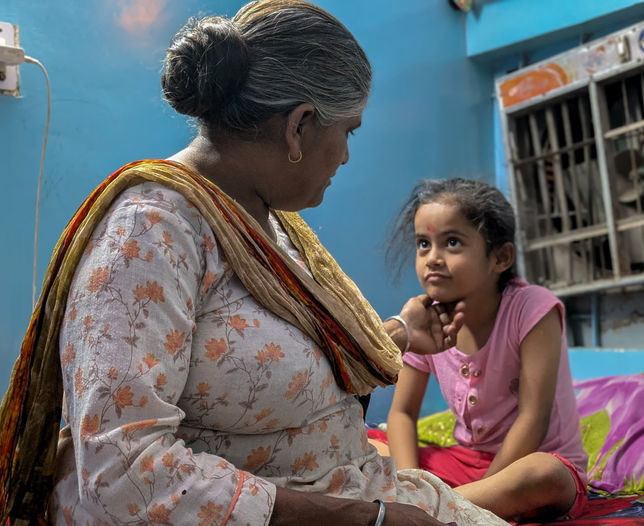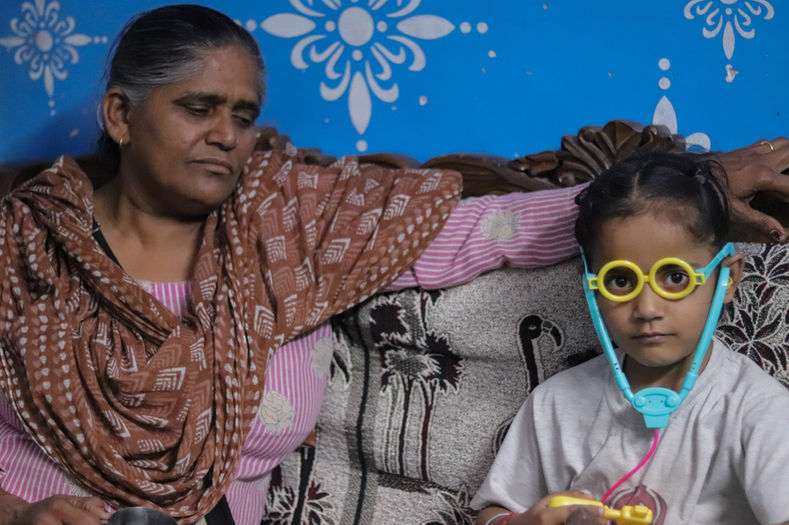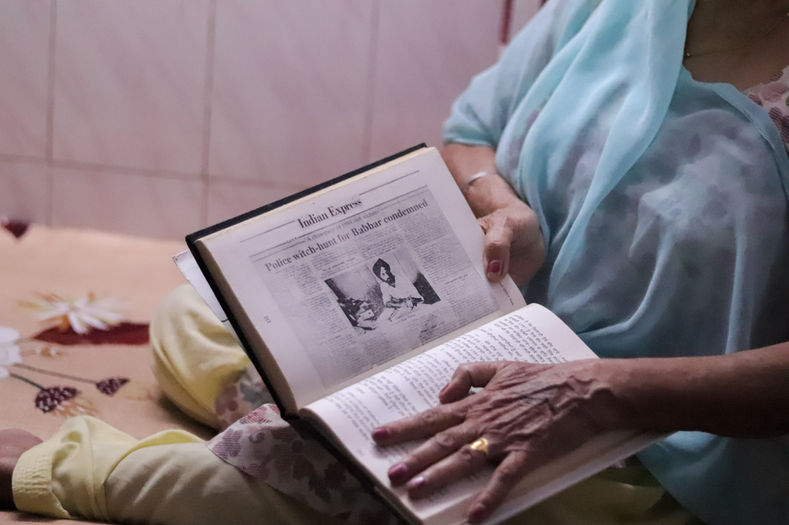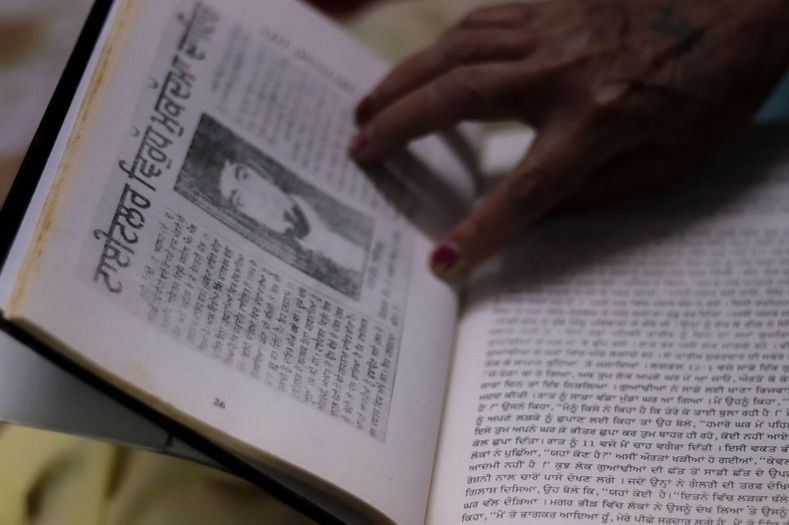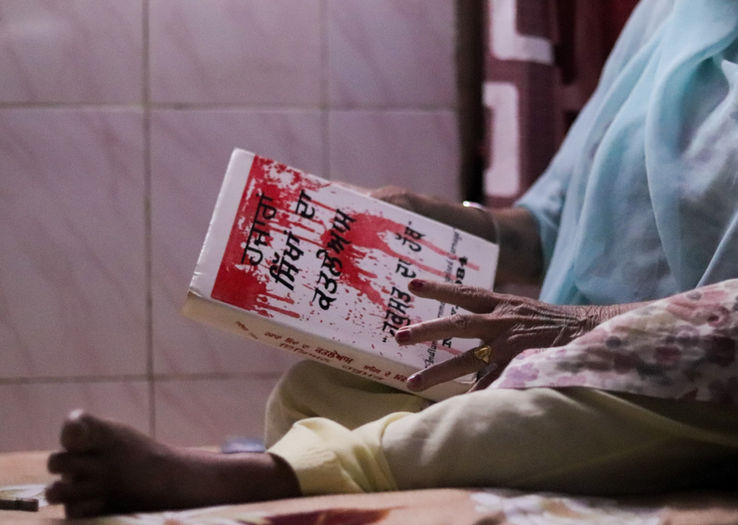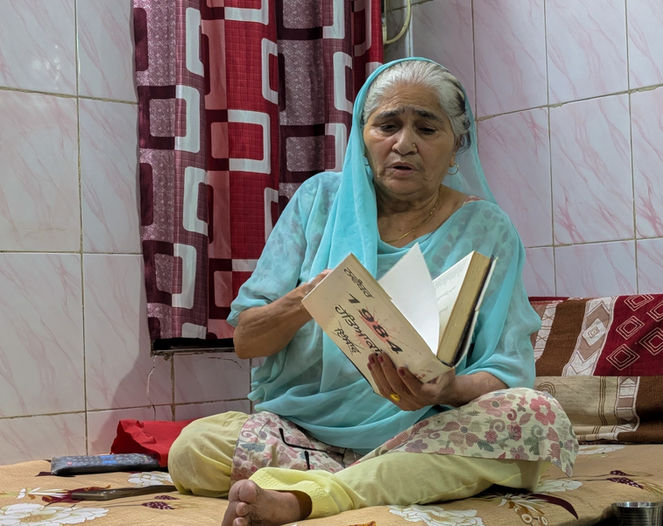
Of Rage and
Rememberance
As soon as you enter her room, on the fourth floor of the dilapidated building, the one thing that will hook your attention in Harleen Kaur’s (name changed) home immediately is this painting titled ‘A Marriage Ceremony’ that demonstrates a quintessential wedding scene in a Sikh family. A bride sits in the center being adorned by the women in her life: sisters, a grandmother, a young girl watching in awe.
This is not Kaur, nor her daughter. Kaur never had a daughter, a fact she remorsefully ponders over, looking at the painting. The painting is merely representational, bought off for Rupees 150 by Kaur in 2015, 31 years after the anti Sikh carnage in Delhi that tore asunder the lives of Sikhs in India and led to the creation of the world’s first widow colony. Kaur was married only for 15 months when in November 1984, her husband handed her over to her sister-in-law as his amanat (keepsake), never to return.

In her very neat drawing room, life and death are tightly held together, lest the wounds of 1984 rip open without invitation. In this neat drawing room, the shelf showcases a frame with young Kaur alongside her granddaughter Noor, the daughter she never had.
From mothers
to daughters.
In many ways, the tale of Tilak Vihar is also a tale of mothers and daughters, mothers and daughters talking, mothers and daughters remembering.
In the evenings, as she takes a break from her long shifts at the vegetable cart by the road, Pappi Kaur, 55 sits with her mother, sometimes sharing her grief and often simply her silence.
For people like Kaur, the struggle did not end with 1984, it continued to debilitate the psyche for the generations of her family to come. Now the only semblance of hope for Kaur is ensuring a good education for her grandchildren. “One generation was ravaged in '84, another in drugs and third remained illiterate,” Kaur says. “As long as I’m alive I want to ensure that my grandchildren get educated and their lives do not go to waste as ours have been.”
Building the life out of scratch was not an easy task for Pappi Kaur, she reflects back on the memories and the home she has left behind in Trilok Puri before 1984, “We did go back (to Trilokpuri). My mother was insistent on staying there. But it was not possible because everyone else had moved here.”
Referring to the Salana Shaheed Samagam (Annual Martyrdom ceremony), Kaur talks about the attempts at remembrance, “on November 1, we all come together for Paath in Gurudwara, even in Trilokpuri. Buses full of people come together for Paath Sahab in Trilokpuri, followed by Bhog on Sunday.”
The Shaheed Samagam is marked every year to commemorate the martyrs of the 1984 anti sikh carnage.
If not for talking, I feel stifled bearing all of this inside me, those same visuals, everything keeps surfacing in my head.
Pappi Kaur
Against Forgetting.
Forty-one years after a carnage that enveloped a people, their history and their trauma in silence, talking feels like one quiet act of respite and resilience to the women of Tilak Vihar.
“When someone asks questions, I respond and cry, my heart feels lighter. If not for this, I would feel stifled bearing all of this inside me. Those same visuals, everything keeps surfacing in my head,” Kaur says.
Seventy-year-old Laxmi Kaur takes turns between offering solace and receiving it from other women. “We meet at the Gurudwara and tell each other, ‘Behenji, I am retired now, Behenji, I need to get my daughter married.”
Talking is also a desperate attempt at remembrance, it's a struggle against the erasure of history. “Some people prefer not to talk about it but I can not restrain myself,” Pappi Kaur adds.
The echoes from the hauntings of 1984 still reverberate in the widow’s colony, the wails are now however muffled into subdued sobs, waiting to be heard, waiting for justice. The process does not seem to be ending anytime soon. It’s a process of women sitting together, grieving together, women talking, women in rage, and women refusing to forgive and forget.
Laxmi Kaur talks about the process of coping with the trauma of 1984 and sharing her grief with other women around her.

